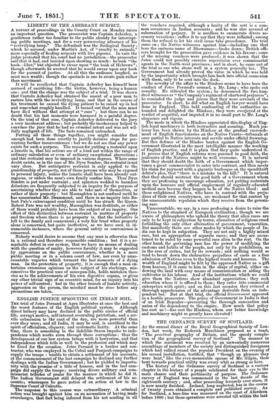dealings with the Indian Government; but he yielded to with
the promise of a title of honour, and in the last cam- paign did supply the troops; receiving divers military and coin- missariat tributes of praise for the manner in -which he did it. The Indian Government still delayed the settlement of his ac- counts ; whereupon he gave notice of an action at law in the Supreme Court of Calcutta. The response to this course was extraordinary. A criminal action was brought against him on an accusation of having made overcharges, that fact being inferred from his not sending in all
the vouchers required, although a laxity of the sort is a com- mon occurrence in Indian accounts ; and he was also accused of subornation of perjury. It is needless to enumerate divers ac- cessory vexations : suffice it to say that they were infliotsa ; among them the refusal to let his civil cause take precedence. The trial came on ; the Native witnesses against him—including one that bore the ominous name of Bhowannee—broke down; British offi- cers brought for the prosecution gave evidence in his favour; some of the missing vouchers were produced; it was shown that the Jotee could not possibly exercise supervision over commissariat agents in the North-west provinces ; and in short, he came out of the trial as one who shone well in a system generally lax. The Government had already proved the value in which he was held by the importunity which brought him back into official connexion with them, only to be sent into the dock.
The novelty of the affair to the Hindoos seems to have been the conduct of Jotee Persand's counsel, a Mr. Lang ; who spoke out roundly. He ridiculed the system ; he denounced the two hun- dred witnesses as "the Company's regiment of chartered perjurers "; he reminded the judge and jurors that they were servants of the prosecutor. In short, he did what an English lawyer would have done in England. This bold confronting of the authorities as- tounded and delighted the Hindoos; they were overjoyed at the verdict of acquittal, and imputed it in no small part to Mr. Lang's eloquence and vigour. The mode in which the Hindoos appreciated this display of Eng- lish legal machinery is both instructive and assuring. Much jea- lousy has been shown by the Hindoos at the gradual encroach- ment of English functionaries on the Native Courts—tribunals at once partial to Native interests and servile under official frowning. But this defence of the Hindoo banker against the English Go- vernment illustrated in the most intelligible manner 4e working of English practice, and it is plain that they quite understood it. It proves that if English reforms were pursued in godd faith, the jealousies of the Natives might be well overcome. It is natural that they should doubt the faith of a Government which impor- tunes a great commercialist to enter into contract, and then meets his claim for payment with a gigantic burlesque on the spendthrift debtor's plea, that " there is a mistake in the bill." It is natural that they should mistrust the good faith of a Governinent whom they see professing to encourage education, yet putting restraints upon the honours and official employment of regularly-educated medical men because they happen to be of the Native blood : and those enlightened Natives, who have to contend with the preju- dices of their own countrymen, are weakened for that contest by the unaccountable repulsion which they receive from the govern- ing race.
Unaccountable, we say, in a race professing a desire to raise the Natives to the standard of European civilization ; though we are aware of philosophers who uphold the theory that alien races are only to be kept in subjection by terror, alienation of religious creed forbidding the only other alternative of government, veneration. But manifestly there are other modes by which the people of In- dia can be kept in subjection. They are not only a highly' raised race, but an aggregation of separate races ; and they are accus- tomed to be ruled by some powerful race alien to the rest. On the other hand, the governing race has the power of modifying the customs and habits of the people, not only by its prohibitions, as in the case of suttee, but by its rewards ; and nothing would so tend to break down the obstructive prejudices of caste as a free admission of Natives even to the highest trusts and honours. The wealth of England might be felt by the oppressed Native as a gift from heaven, if it came to him in the shape of capital, either en- , dowing the land with easy means of communication or aiding the cultivator in his labour. And of the institutions which we could give them the Natives show abundant appreciation : they seek education where it is offered to them ; they enter into commercial enterprises with spirit; and on this last occasion they evinced a thorough apprehension of the advantage derivable from an inde- pendent bar. But at that trial, the official Government appeared as a hostile prosecutor. The policy of Government in India is that of an Irish Repealer—preventing the thorough annexation and union of the dependency to the empire. How much that policy has cost us !—has cost the Hindoos, whom our better knowledge and machinery might so greatly have elevated !


























 Previous page
Previous page